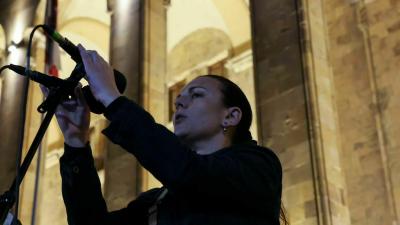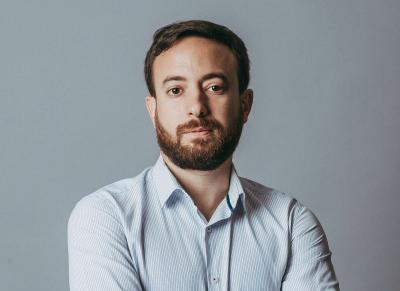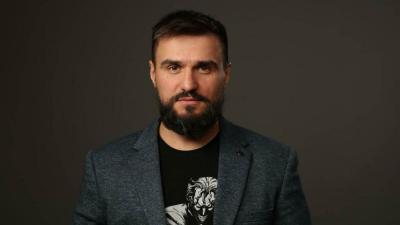“The demonstrations in Georgia are not going to slow down because we know what is at stake”: An interview with Nona Mamulashvili
The only way to defeat them is through elections, but when almost the entire state is in the hands of an oligarchy, you need enormous support to be able to reverse the situation.
Nona Mamulashvili, co-founder of the civic platform ‘Gamziri’ and former member of the Georgian parliament for the United National Movement (United Opposition), holds a BA in Business Administration from the International Black Sea University, an MA in Diplomacy and International Relations from the University of Westminster (London), and a PhD in International Relations and an MA in the History of Arab and Islamic Civilisations from the Sorbonne University (Paris).
Álvaro Peñas: Has it been a long time since we have seen such large demonstrations in Georgia?
Nona Mamulashvili: Last year there were protests because they wanted to pass this same law on foreign agents, they withdrew it, but a year later they have brought it back. It was unexpected and a lot of people don’t understand why, but it’s clear that they have their reasons.
And what are those reasons?
The elections are in October and they need to silence civil society, which is very active in Georgia compared to the other countries of the former Soviet space. Georgian Dream, the ruling party, is mired in corruption and of course wants to silence the media that denounce it and prevent the presence of international observers in the elections that come from civil society. Just a few days ago, Bidzina Ivanishvili, who is the oligarch who really rules Georgia, literally said what they were going to do; pass this law and persecute the opposition.
The foreign agent law has been called a ‘Russian law’ because it is very similar to the one that exists in Russia and has been used to break up associations uncomfortable for the Kremlin and persecute dissidents, but it is presented as a law to find out how much money an association receives from abroad.
In 2012, Putin pushed through the concept of democratic sovereignty that was then more or less acceptable in the West. This law was presented as a transparency tool to know how much money was coming to any association from abroad and to declare it, but when you published something on your website or made a video, you had to sign with the label “foreign agent”. The fact is that once the law was passed by the Duma, the Ministry of Interior added new amendments. At first it was just a transparency law, but then they used the law to close Memorial, the biggest human rights organisation in Russia. Then they continued with other NGOs and dissident media, adding more and more tools of control over critics, even private individuals, so that they could cut your funding, close your business, ban your association and arrest you.
This definition of “foreign agent” sounds very Soviet.
Exactly. Coming from the Soviet past, when you have a category that represents a foreign agent, for most people who swallow the propaganda you are an agent, an enemy of the people as it was qualified in the Soviet Union and you can be sent to the GULAG. That’s how it works.
What stage has been reached in the passage of the law?
There have already been two hearings, the second one was the most important because it was where it was decided whether the approval would go ahead or not, and a third one is needed, which is technical. They have a majority in parliament, so I have no doubt that this law will be passed.
Despite the huge demonstrations on the streets.
Yes, Georgia is walking a tightrope, but all these street demonstrations are not going to stop because it is not about this law, it is about a change of course in foreign policy.
A change of course more than evident when the Georgian government has just announced that it is not ready to join the European Union and looks like a return to the Russian orbit. What is the reason for this change?
When Ivanishvili returned in 2012, there were Atlanticists in the governing coalition, but he pushed them out one by one with the support of the Kremlin and a pro-Russian mentality took over. However, more than 80 percent of Georgians see their country in Euro-Atlantic structures, which is why they have not taken a more direct approach and, for example, last year withdrew the law they have now passed. They have used a Putinist approach, imprisoning young people who took part in the protests and threatening their parents with job loss (in Georgia the biggest employer is the state), and employing the Russian-style propaganda machine, pointing out that civil society wants to bring Western degeneration to the youth, that traditions and religion will be lost, etc. This propaganda no longer works because we have put up with Russians for many years and know their mentality, and because the reality is that during Easter the young people who demonstrated went to church earlier to pray. It may fool older people who only watch state television, but not a majority who are informed by social networks.
We are also aware of Russia’s threats and provocations, because we have already experienced them. The real danger is that the risk of escalation is very high and the responsibility for all this lies with Georgian Dream. They are in power and in all likelihood they were going to win the elections again in October, but they have decided to push this law through - along with a tax reform that favours the oligarchs - polarising society and even threatening, as some of their members have said openly, that if they don't govern there will be a war with Russia.
Some people compare what is happening in Georgia with the Maidan revolution. Do you think they are comparable?
No, this has nothing to do with the Maidan because we understand that the stakes and the risks are very high. 20% of our country is occupied by the Russian army and nobody wants to give them an excuse for war. That is why I insist that the responsibility for everything that happens in Georgia lies with Georgian Dream, because they have started this and, if a war starts, Russia will do what is in its nature: conquer, loot, kill, burn... It is something we don’t want to see.
Has there been any reaction from the European Union to the drift of events in Georgia?
It is a great disappointment. The European Union, especially the European Parliament, makes resolution after resolution and shows a lot of concern, but, as usual, does not take any action and always says that action is on the way. Maybe, perhaps, the European Parliament will impose sanctions against all those who vote for this law, but in the meantime, they have all prepared to face those sanctions. The only thing that is clear is that sanctions cannot be against the country because its people are demonstrating in the streets for a future in the West.
Can these demonstrations strengthen the opposition in the run-up to the October elections?
The only way to defeat them is through elections, but when almost the entire state is in the hands of an oligarchy, you need enormous support to be able to reverse the situation. And we also have to take into account the global changes that are going to take place: there are elections in the EU and the US; we don’t know what is going to happen in the Middle East and Iran is next door; and we don’t know what is going to happen in Ukraine or the Balkans. Our geographical situation does not allow us to take certain risks because we are on a tightrope and we can fall anywhere.
How long do you think the pressure on the streets will last?
It will not diminish because the people on the streets understand what is at stake. We are doing everything we can to avoid violence and not to fall into provocations, although all possible scenarios are complicated.
* Photo by Leli Blagonravova
Read also
“Russia has no interest in ending this war, and only by understanding this can we deal with the Kremlin”: An Interview with Olexsandr Shulga
Russia reminds us every moment, through brutal and horrible acts, of what awaits us if we surrender: the end of our national identity and the murder of all those who, politically or culturally, embody the Ukrainian nation.
Álvaro Peñas
Carolina Barrero: “In Cuba there is no food or medicine, but the regime builds hotels rather than hospitals”
Interview with Carolina Barrero, activist for the defence of human rights in Cuba, self-exiled in Spain since February 2022.
Álvaro Peñas
Growing problems for the Soviet Federation
In a message on social media, Donald Trump claimed that Russia’s economy is crumbling and that he would do it the favour of allowing it to end a “stupid” war that should not have started.














Comments (0)